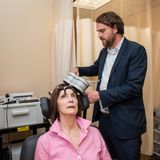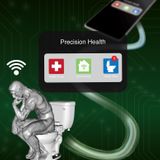RECENT ARTICLES

Stanford researchers devise treatment that relieved depression in 90% of participants in small study
Latest information onStanford Medicine researchers used high doses of magnetic stimulation, delivered on an accelerated timeline and targeted to individual neurocircuitry, to treat patients with severe depression.- By Mandy EricksonA new form of magnetic brain stimulation rapidly relieved symptoms of severe depression in 90% of participants in a small study conducted by researchers at the .The researchers are conducting a larger, double-blinded trial in which half the participants are receiving fake treatment. The researchers are optimistic the second trial will prove to be similarly...…Latest information onStanford Medicine researchers used high doses of magnetic stimulation, delivered on an accelerated timeline and targeted to individual neurocircuitry, to treat patients with severe depression.- By Mandy EricksonA new form of magnetic brain stimulation rapidly relieved symptoms of severe depression in 90% of participants in a small study conducted by researchers at the .The researchers are conducting a larger, double-blinded trial in which half the participants are receiving fake treatment. The researchers are optimistic the second trial will prove to be similarly...WW…

‘Smart toilet’ monitors for signs of disease
Latest information onA disease-detecting “precision health” toilet can sense multiple signs of illness through automated urine and stool analysis, a new Stanford study reports.- By Hanae ArmitageThere’s a new disease-detecting technology in the lab of , MD PhD, and its No. 1 source of data is number one. And number two.It’s a smart toilet. But not the kind that lifts its own lid in preparation for use; this toilet is fitted with technology that can detect a range of disease markers in stool and urine, including those of some cancers, such as colorectal or urologic cancers. The device could...…Latest information onA disease-detecting “precision health” toilet can sense multiple signs of illness through automated urine and stool analysis, a new Stanford study reports.- By Hanae ArmitageThere’s a new disease-detecting technology in the lab of , MD PhD, and its No. 1 source of data is number one. And number two.It’s a smart toilet. But not the kind that lifts its own lid in preparation for use; this toilet is fitted with technology that can detect a range of disease markers in stool and urine, including those of some cancers, such as colorectal or urologic cancers. The device could...WW…
- Total 2 items
- 1